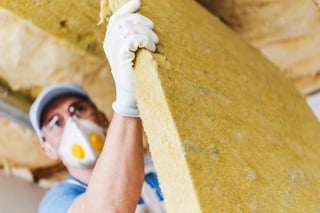 It has been around for decades and though its manufacturing process sounds rough and caustic, it can be downright graceful in its application.
It has been around for decades and though its manufacturing process sounds rough and caustic, it can be downright graceful in its application.
It is mineral wool insulation, "made by melting basalt stone and recycled slag from steel mills and then spinning it into fiber that is formed into batts and boards." It is used in Canada, Europe and China and it show signs of becoming more widely available in the United States. Here's why:
-
Mineral wool batts are great insulators, often exceeding the R-value of fiberglass batts. This two-digit number refers to an insulator's thermal resistance, or how well it blocks heat from flowing through it. Mineral wool batts for walls usually have an R-value of 15 while standard fiberglass batts carry an R-value of 11 or 13 (though you can special-order batts in a higher value).
-
Mineral wool withstands intense heat better than other forms of insulation and it doesn't release smoke or gas. Many American builders have taken note of several deadly office building fires in China that have been blamed on combustible insulation. In response, the country now mandates the use of mineral wool in tall office buildings.
-
Mineral wool repels water, staying intact even after becoming wet (similar to foam insulation). Since mineral wool resists water, it means mold, mildew and fungi growth are less likely to develop.
-
Mineral wool is “vapor permeable.” This means it allows buildings to “breathe,” affording better control over humidity and condensation and resulting in better air quality.
-
Mineral wool is durable. High-rise buildings in New York, under construction through the winter, show it doesn't flinch in the face of rain, sleet, snow and ice. And mineral wool will not rot or deteriorate over time.
-
Mineral wool is simple to cut and install. Cutting fiberglass batts to size might be likened to cutting through gelatin; cutting through mineral wool is more like cutting through pound cake. Mineral wool's rigidity allows for more precise cuts – important when you're trying to insulate thin wires and meandering outlet boxes. As such, mineral wool results in less waste. Once it's properly cut to size, mineral wool doesn't flop around and resist efforts to settle it into place. Whereas fiberglass insulation on ceilings must be secured with supports, mineral wool can be gently pushed against a surface, where it stays put.
-
Mineral wool offers superior soundproofing abilities. You can trace this quality straight to its denseness. It blocks and absorbs sound between walls and floors like a maestro.
-
Mineral wool has aesthetic appeal. Of course, once a building is closed up, you don't see insulation. Until then, the dark fibers of mineral wool insulation creates a shadowing effect and is easier on the eyes than bright pink batts.
Size up two minor detractions of mineral wool
-
Mineral wool can cost more than fiberglass batts. However, the difference, by the square foot, is nominal. And because there is less waste, mineral wool could actually be more economical in some installations.
-
Mineral wool can be itchy. In this way, mineral wool is similar to fiberglass, which can also cause rashes. As with all forms of installation, these effects can be mitigated when installers where long sleeves, gloves and goggles, as well as a dust mask.
The team at First Quality Roofing & Insulation doesn't expect our customers to match our enthusiasm for mineral wool insulation. Just as writers love words and cooks love food, we love insulation because it is fundamental to what we do. We also know full well that a properly insulated home stays cooler in the summer, warmer in the winter and is more energy efficient.
We're sure people will keep talking about mineral wool insulation – and First Quality will be listening. Curious as to what insulation is best for your home? Download our Home Insulation Guide for all the information you'll need. Call First Quality & Insulation at 702-270-8772.

















